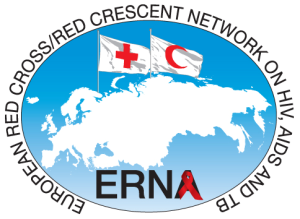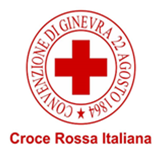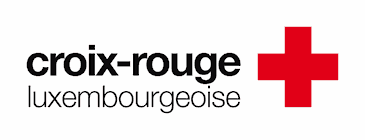
Terms of Reference
for the European Red Cross and Red Crescent Societies Network on HIV/AIDS and TB (ERNA)
HISTORICAL BACKGROUND
Since 1987 the International Federation of Red Cross and Red Crescent Societies has been engaged in the fight against HIV/AIDS. The decisions of the General Assemblies in Rio 1987, Budapest 1991 and Birmingham 1993 have been the guiding policies for the interventions of the Federation in the control and prevention of HIV/AIDS, in caring for the infected and affected persons and families and in the promotion of Human Rights and prevention of discrimination and stigmatization of persons infected with HIV.
At the European Regional Red Cross Red Crescent Conference that took place in2002 in Berlin, National Societies decided unanimously to focus both on the HIV, AIDS and TB, and strengthen the network to support these activities.
At the 14th International AIDS Conference in Barcelona 2002, Senior IFRC Management staff who participated in the conference reiterated their commitment to further strengthen the fight against HIV and AIDS.
AIDS is one of the major public health problems in Europe. There is acritical need for fostering preventive measures, psychological support and care for persons living with HIV, AIDS and their families and promotion of Human Rights and dignity. The involvement of NSs in the fight against HIV and AIDS must be intensified. Innovative approaches must be promoted- concerted efforts by pooling resources, knowledge, skill, experiences and best practices are required. Collaborative interventions must be promoted. These could be achieved through regional networking strategy.
The work so far performed by the Working Group on HIV, AIDS and Substance Abuse of the European Social Welfare Network of NSs of the EU member countries gives inspiration for the initiation and implementation of the aforementioned measures. The establishment of a body that can co-ordinate the sharing of experiences, transfer of best practices and the promotion of collaborative efforts among NSs of the European region was imperative. This organ which can be recognized as a working group could be organized in a Network form and it can operate based on networking strategy. An effort along this line was initiated at the end of 1987 when the North American and some European National Societies formed a Task Force on the prevention and control of HIV/AIDS, which was operational up to 1992 and later gradually phased out. Thus, the current efforts are directed towards revitalizing it by involving European National Societies. In 1997 the IFRC created European Network of RC/RC on HIV and AIDS (ERNA).
DEFINITION
ERNA was created as an informal working group composed of National Societies. Any European National Society (defined as such by the IFRC) has a standing invitation to join this Network.
MISSION OF THE NETWORK
to encourage participation and to help strengthen National Societies’ operational capacity in the field of HIV, AIDS, TB and other communicable diseases by gradually developing activities at the community level, particularly in the areas of prevention, care, treatment, control, harm reduction, psychosocial support, legal support, reduction of stigma and discrimination social integration and other community activities targeted at the most vulnerable people; to help NS’s advocate for the circumstances enabling dignified life of PLHIV and people living with TB and provide them with access to full medical treatment.
OBJECTIVES
The following are the objectives of the Network:
General objective
To contribute to the reduction of the spread of HIV, AIDS, TB and other communicable diseases principally among the most vulnerable people
Specific objectives
- To strengthen and promote the exchange of experiences, information and best practices among member NSs, with other stakeholders and NSs from other regions
- To promote the setting up of (innovative) new initiatives and to reproduce them in other NSs by adapting them to the need of local beneficiaries
- To promote and facilitate concerted collaborative actions in the field of HIV, AIDS, TB and other communicable diseases with UN agencies, EU, non-governmental organizations, Global Fund (to fight AIDS, TB and Malaria),other international and national organizations and with existing Federation’s Networks
- To involve PLHIV and other vulnerable groups in ERNA work at all levels
- To give technical support and assistance to member NSs (upon expressed need) in areas where a gap in knowledge and skill exists with motivation and trainings organization or by enlarging their operational capabilities
- To render technical support and assistance to NSs in countries in transition and developing countries through common projects of European NSs
ORGANIZATION
The European HIV, AIDS and TB Network is a multi-disciplinary group comprising National Societies from Europe and Central Asia. Each member NS shall appoint one person as its representative in the Network.
ERNA BOARD
ERNA Board consists of a President and two Vice-Presidents.
President is elected for three years at the General Meeting (GM). He/She takes over his/her mandate and replaces the former President – right after General Meeting. He/She can be reelected for the same position once (two terms on the same position).
One Vice-President represents the country which hosts the Secretariat and is automatically appointed following selection of his/her NS.
The other Vice-President is elected for three years at the General Meeting. He/she should be a representative of his/her National Society. The other Vice-President takes over his/her mandate and replaces the former Vice-President – after the General Meeting. He/She can be reelected for the same position once (two terms on a same position). If for any reason the President cannot execute his/her mandate, the elected Vice-President assumes his/her responsibilities and takes over the mandate of a President till the next elections.
European Youth Coordination Committee (EYCC) of the Red Cross and Red Crescent European Youth Network is invited to nominate one representative to be a permanent advisor at the Board for one year, at the ERNA annual General Meeting. This reflects ERNA’s commitment, in line with the IFRC Youth Policy, to the active participation of youth in decision making processes at the national and international level, promotion of youth leadership and exchange of concrete ideas, innovations and activities.
ELECTIONS
Each member National Society identifies one person to whom it delegates the right to vote on its behalf. Each member National Society has one vote. The members of the Board have right to vote only in case when they officially represent their National Societies.
The elections of members of the Board shall be by secret ballot unless a candidate has been acclaimed. In the case of upcoming elections, NSs are invited to present their candidates to the Board and send CVs 1 month before the General Meeting. The quorum needed is defined by number of member National Societies participating in the General Meeting (altogether with valid mandates from absent NSs) For adoption of the result of voting the simple majority of the defined quorum is needed (i.e.- one half + one)
The candidate for President/Vice-President present themselves during the General Meeting and who gets majority of votes becomes a new President/Vice-President of ERNA Network.
National Society, which is not present at the General Meeting can officially transfer the right to vote to any participating National Society. One National Society can receive the right to vote from other two National Societies maximum, and represent these at the GM.
ERNA SECRETARIAT
For its functioning ERNA disposes a Secretariat hosted by a member National Society with a Coordinator appointed by the host National Society assuring its continuous work. The host of the ERNA Secretariat is elected one year after the elections of the ERNA Board and can be reelected.
The NS hosting the Secretariat of the Network commits to assign office space and supporting staff who will assist in executing the day to day activities of the Network such as correspondence, compilation and write-up of reports, financial administration etc. The salary of the Coordinator shall be covered by the core budget of the Network.
The working languages of the Network are English and Russian. With a view to greater efficiency, training seminars requested by certain National Societies can be conducted in the appropriate language.
ANNEX 1: ERNA Secretariat Key Tasks and Responsibilities
The role of the ERNA Secretariat is to support the ERNA Board in chairing the network and member NSs in fulfilling ERNA mission. The ERNA Secretariat is an operational body of the network, in charge of putting decisions by the General Meeting and the Board into practice. It is the link between ERNA Board and members with the IFRC representatives as well as with other representatives from the Movement and external stakeholders.
KEY TASKS OF THE ERNA SECRETARIAT
- Organization and technical support of the ERNA Board meetings, including logistical arrangements.
- Preparation of the report of the Board meeting within 2 weeks, with clearly written agreed actions to be taken by each member.
- Liaising with the IFRC ERNA contact person and sharing of information in regular and transparent way.
- Maintenance of ERNA website, with constant provision of updated information about upcoming Board meetings, publication of Board meeting minutes and other relevant documents, collection and editing of relevant issues and news decided by Member NSs and the Board itself.
- Regular update of the list of ERNA NSs contact persons.
- Use of group emails of all ERNA NSs contact persons, always CCing to Board members.
- Promote the visibility of the ERNA activities;
- Support the organization of ERNA General Meeting:
- Sending invitation to NSs
- Sending invitation to guests as decided by the Board
- Supporting host NS in logistical arrangements (through visits prior to the meeting if necessary)
- Selecting a person in charge of minutes taking during the General Meeting
- Finalizing the report of the General Meeting not later than one month after the meeting
- Arranging the financial transactions to the host NSs in agreement with the NS and respecting the time-frame for bank transfer
- Management of ERNA annual budget, preparation of financial reports every two months in the most advanced software available in the Secretariat NS.
- Preparation of the drafts of annual Plan of action, Budget and reports to be reviewed by the Board.
- Representation of ERNA as assigned by the Board.
RESPONSIBLE PERSON
The ERNA Secretariat is managed by the ERNA Secretariat General Coordinator: a full time officer charged with the above listed duties, who facilitates achievement of the ERNA Mission.
BUDGETING
Financial support for all ERNA Secretariat related costs is provided by the ERNA members through voluntary contributions.
WORKING METHOD
The Network is an informal group which mainly works on the principle of consensus. If unanimity cannot be achieved, voting procedure shall be used.
Member National Societies shall get together once a year at a General Meeting. The Network shall execute and co-ordinate its actions through planned workshops and visits.
The GM agenda shall be developed and sent to NSs no later than six weeks ahead of time. Workshops on selected topics based on identified and/or expressed needs will be arranged in conjunction with the General Meetings.
The report of the proceedings of the meetings and workshops and other technical documents shall be compiled by the Secretariat of the Network and sent to member NSs and relevant IFRC structures. In order to motivate all NSs of the region, reports of the meetings shall be available to non-member NSs as well. Exchange of experiences and best practices will be facilitated through side visits and other feasible mechanisms. If necessary, the Network can invite experts or representatives from international and national organizations to participate in its meetings as observers and/or for exchange of experience and knowledge as well as exploring means of collaboration. Similarly, the Federation representatives can participate in the Network events as observers.
FUNDING
The core budget needed for the salary of the coordinator and for programs shall be prepared by the Board and submitted to the General Meeting for approval. The endorsed core budget shall be sent to NSs with a view to receive contribution. In addition efforts shall be exerted to mobilize additional funding from other possible donors. The International Federation of RC/RC Societies shall facilitate potential funding.
ANNEX 2: MEMBER NATIONAL SOCIETIES: KEY TASKS AND RESPONSIBILITIES
ERNA comprises members of National Societies from Europe and Central Asia.
Each Member NS has to appoint its representative at the ERNA Network –ERNA contact person: it is desirable that the NS representative at the ERNA Network stays committed to cooperation with ERNA for at least two years.
The ERNA representative must fulfil the following obligations:
- to be a focal point for ERNA at NS level
- to actively contribute to ERNA and advocate on behalf of its mission
- to actively participate in the ERNA General Meetings
- to be committed to fulfillment of the Statement of the General Meeting
- to co-operating with other members, the ERNA Secretariat and Board to fulfil the ERNA Mission and implementing effective communication and networking with other ERNA members and external stakeholders
- to submit regular reports and answer the requests of the ERNA Secretariat when required
- to sharing news and good practices from his/her NS with the ERNA Secretariat through mail and the ERNA web-site
If a representative does not meet these obligations or is unable to accomplish ERNA related key tasks the National Society must assign another person for the Network.
New members nominated by their National Society need to send the official letter to ERNA Secretariat.
Membership of National Societies in ERNA is permanent as long as they meet their obligations as an ERNA member; however, a National Society also retains the right to withdraw from the network if desired, by giving notice at ERNA meeting or in writing to the ERNA Secretariat.
ANNEX 3: ERNA BOARD MEMBERS: KEY TASKS AND RESPONSIBILITIES
Following the General Meeting recommendation, the Board develops a year Plan of Action, identifying the needs of National Societies and developing relevant and effective strategies to address those needs. Besides, every two years a Strategic Plan shall be developed. Both these two documents, in a draft version, will pass through a consensus process with all the ERNA members, before being finalized and shared with all RC/RC European NS with IFRC offices in Geneva and in Budapest (ERO) for a wider awareness and fundraising.
The Board shall be committed to punctual following the approved PoA, putting it into action, monitoring and evaluating its effectiveness.
The Board shall be permanent contact and productive inter-exchange with the ERO.
The Board shall meet face to face minimum twice a year and via Skype conference – three times a year or more if necessary.
All related expenses for the Board members shall be covered only by the ERNA budget if they are not able to be met by the budget of their National Societies.
If a Board member does not meet the above key tasks and responsibilities obligations of participation or is unable to contribute to the tasks, a new member shall be appointed to replace her/him until the next ERNA GM.
The ERNA Board members define the participants to be invited to the Board meetings: representatives of the ERO, National Societies, partner organizations, ERNA Secretariat.
ERNA President
Dr. Massimo Barra








